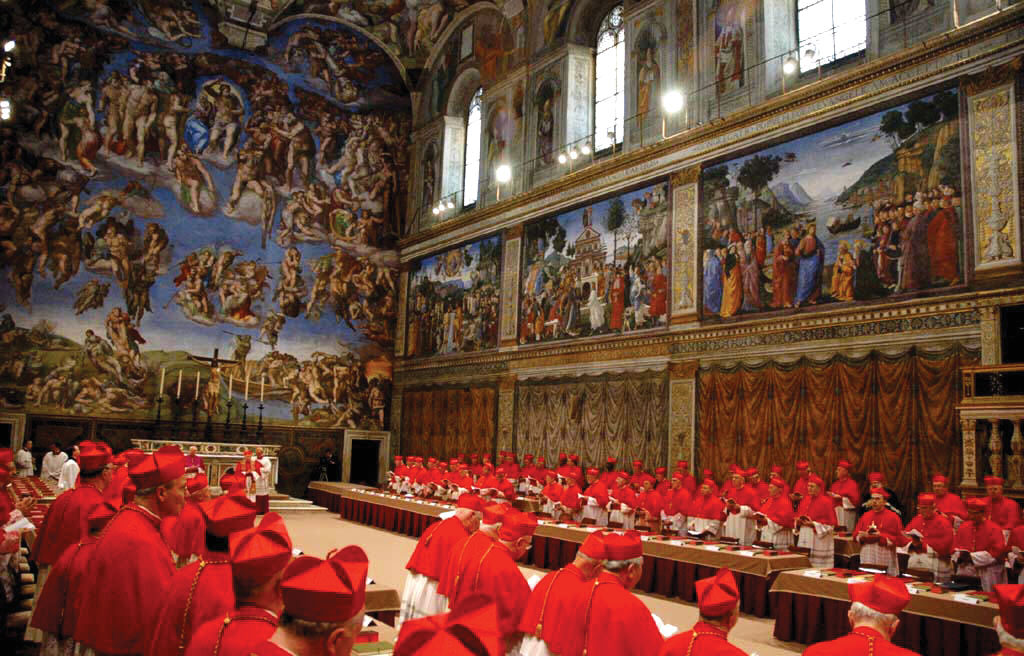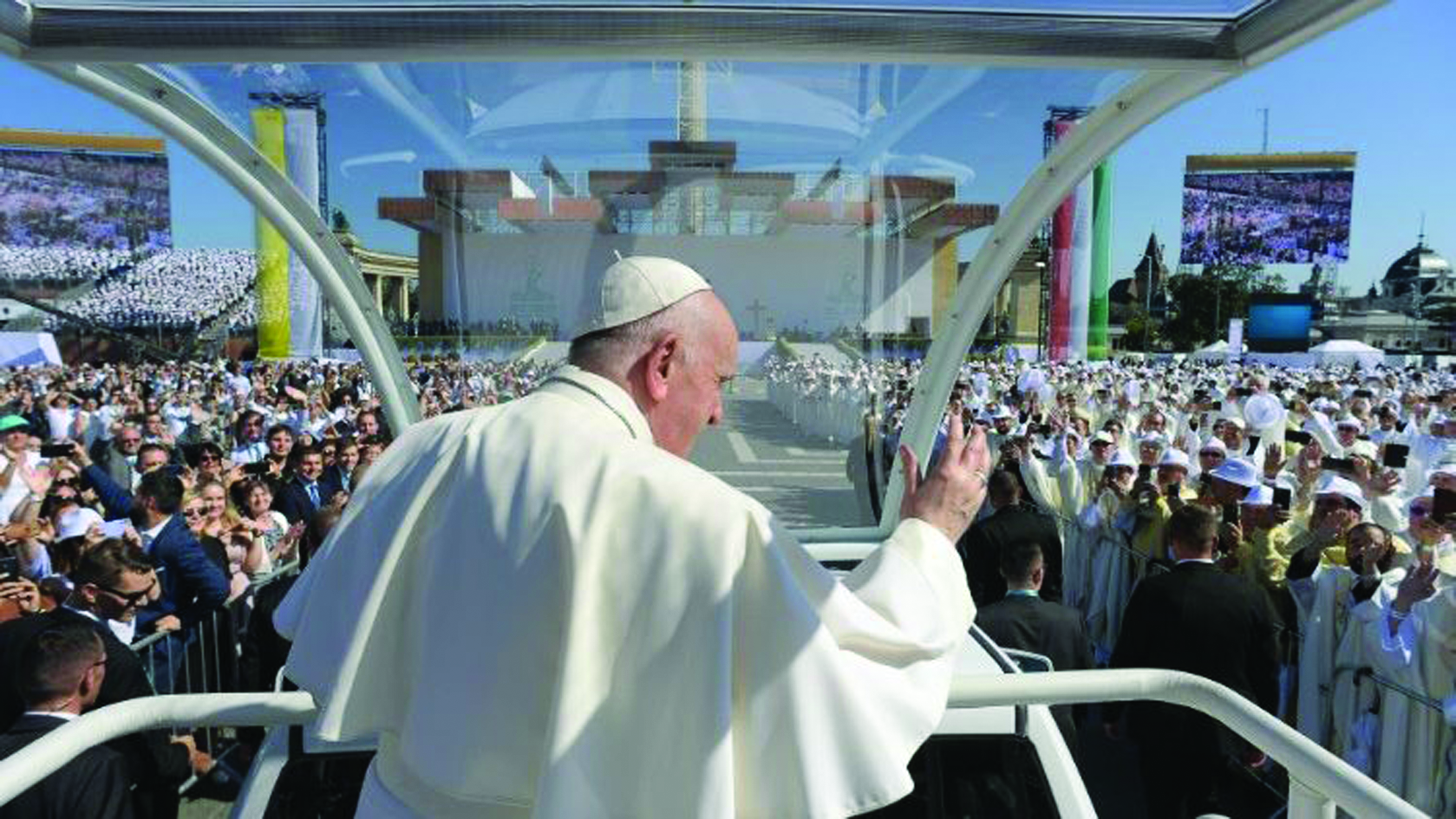
Cardinals pray before the beginning of the conclave in which Cardinal Joseph Ratzinger was elected as Pope
Monsignor Juan Ignacio Arrieta, secretary of the Pontifical Council for Legislative Texts, on the norms during the sede vacante and the election of a new Pope.
The secretary of the Pontifical Council for Legislative Texts, Msgr. Juan Ignacio Arrieta, met with journalists at a briefing held in the Vatican Press Office, to supply a new interpretation of the Apostolic Constitution Universi Dominici Gregis (The Lord’s Whole Flock).
On the Feast of St. Peter’s Chair, February 22, 1996, John Paul II promulgated a complex constitution, Universi Dominici Gregis, which is still in force.
It is clear that the author of the constitution had in mind, above all, the procedures to follow in the event of the Pope’s death. With reference to the vacancy of the Apostolic See following the Pope’s resignation, however, one point is yet to be clarified which raises doubts and questions from journalists. John Paul II’s constitution states that the conclave is to open 15 days after the Pope’s death, a point which has required more than one explanation from Msgr. Arrieta, since in the present case there is no need to wait the 9-day mourning period following the Pope’s death because Benedict XVI has resigned.
In no way can cardinals intervene to change the electoral system.
As long as the Holy Father remains in charge — said Monsignor Arrieta — he can modify the procedures for papal election. Once the Apostolic See has become vacant, only the College of Cardinals can appoint the day for the opening of the conclave.
As Arrieta pointed out, the Pope might dispel all doubts with a departure from the constitution so that the cardinal electors will not be detained away from their see for a further 15 days. Then he said that the only change to the Constitution Universi Dominici Gregis was made by Benedict XVI in 2007 with the motu proprio De Aliquibus mutationibus in normis de electione Pontifici, which restores the 2/3 quorum for an election to be valid. After the 34th scrutiny — or the 35th, if a vote was held on the opening day of the conclave — the two cardinals who have polled the highest number of votes come up for second ballot. The 2/3 quorum is always required for the election to be valid.
During his meeting with journalists, the Vatican canonist illustrated what happens during the vacancy of the Holy See.
Once the Apostolic See has become vacant, it is up to the Congregation for Cardinals to appoint the date for the opening of the conclave. The College of Cardinals is entrusted with the government of the Church only to deal with problems relating to routine administration, because all the cardinals holding offices in the Curia lose them except for the camerlengo, the penitentiary and the cardinal vicar.
If there are any serious questions to deal with, decisions are made by majority vote. During the vacancy of the Apostolic See two congregations for cardinals are formed: the former, a general congregation is made up of all cardinals; the latter, referred to as “particular,” includes the camerlengo and three other cardinal electors chosen by lot every three days.
Monsignor Arrieta emphasized that no cardinal is exempted from participating in the conclave. Although renunciation for certified health reasons is contemplated, it has to be accepted by the College of Cardinals.
Throughout the duration of the conclave, the cardinals are not allowed to have contacts with the outside world or to use Twitter and can even have their mobile phones “confiscated.” Any cardinal who gives anyone information on the election of the Pope will incur automatic excommunication. Still, he said, even excommunicated cardinals have the right to vote.
Another current issue is that concerning cardinals called to account for a crime.
“A cardinal deprived of his freedom cannot participate in a conclave, but keeps his right of vote; so does an excommunicated cardinal,” Arrieta said in reply to the journalists who were implicitly referring to the American Cardinal Roger Mahony, accused of having covered up the crimes of pedophile priests. “Only those who have lost their status of cardinal are no longer eligible to vote in a papal conclave,” he said.
Asked about the sanctions inflicted for breach of secrecy, Monsignor Arrieta referred to the “penal” section of John Paul II’s constitution, which goes as far as to contemplate latae sententiae (i.e., “sentence already passed” or “automatic”) excommunication; this also applies to simony, i.e. the buying and selling of votes.
This constitution invites cardinal electors to abstain from “any form of pact, agreement, promise or other commitment of any kind.”
Finally, as far as the voting is concerned, there will be four ballots a day, two in the morning and two in the evening.
The briefing was held in the Vatican Press Office three days before the release of the motu proprio promulgated by Benedict XVI.






Facebook Comments